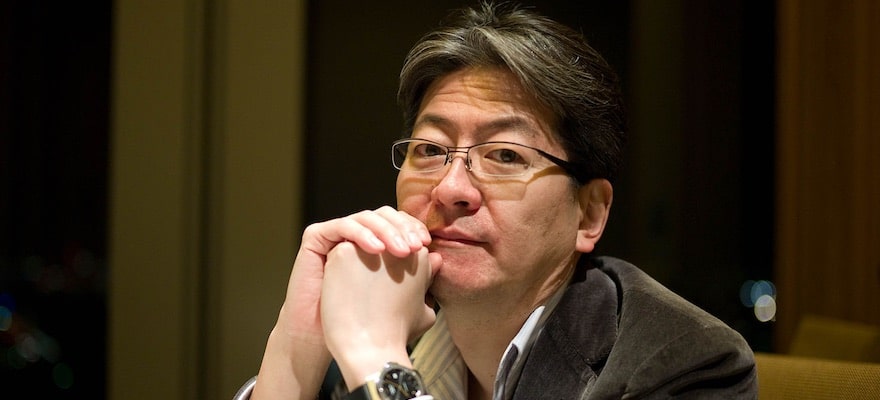Recent quarters have brought tectonic shifts into the retail foreign exchange industry. On the eve of the new EU regulatory framework taking force, we are turning to a brokerage in a country which has been heavily regulated for many years. Japanese brokers have recently celebrated a victory by preventing an even tougher regulatory framework from being enforced.
In an exclusive interview with Finance Magnates, the founder and CEO of Monex Inc, Oki Matsumoto shared some insights about how brokers from the Japanese industry prevent tougher regulations. We also spoke about the opportunities the cryptospace offers and how good of a fit last month's acquisition of Coincheck by Monex is for the company.
Brokers and Regulation Trends
FM: How do you see the regulatory picture globally and how is it affecting you?
OM: I think that the brokerage industry should work closer with the regulators globally. If we take the recent FX leverage changes discussions in Japan, more and better communication was the main reason why the Japanese regulators rolled back their initial plan. The discussion with authorities has basically come full circle - it started from a very harsh proposal, which caused ripples across the industry in Japan. Regulators and market players didn’t understand each other, but they had a lot of tenacious discussions, and at the end, the watchdog did understand the situation better, and there was no adverse effect on the FX industry.
If we speak crypto, there is not much real difference - regulators and the industry should be communicating more together in clear terms. Regulation is sometimes made without an understanding of the products available on the market. Communication has become less in recent years, and the gap between brokers and regulators has become wider. The industry all over the world should seriously try to engage way more frequently with regulators. If the regulators don’t understand a certain product very well, they will eventually squeeze it out of the market.
Crypto Potential
FM: Tell us more about your acquisition of Coincheck and the long-term potential of the deal.
OM: Cryptocurrencies are the most volatile asset class in the world right now, and traders love Volatility . On the other hand, volatility in other markets has come down. Cryptocurrencies have become a very attractive asset class for traders. Therefore, we believe that there is a good deal of business opportunities in cryptocurrency trading for us.
The market cap of the cryptocurrency space is close to $250 billion. Meanwhile, the market cap of gold supply circulating is closer to $8 trillion. This means that the current market cap of cryptocurrencies represents about 3.1 percent that of the entire gold market. This speaks about the potential of cryptocurrencies as an asset class going forward.
FM: Is the lack of regulation preventing this asset class from growing further?
The cryptocurrencies market is very similar to the derivatives market in the 1980’s. Back then, very few people understood derivatives and the markets were very immature, imperfect and regulators didn’t like derivatives. In three years time, all business schools in the world were teaching derivatives, and everybody came to understand the products.
The markets matured quickly, and the regulators embraced the products opening the doors to one of the biggest markets in the world. We believe that the same trend is now unfolding with cryptocurrencies. If you look at the 80’s, the smartest professors, the most talented traders and overall, the greediest people, took the biggest risks and invested time and money into derivatives. This fusion pot is now happening with cryptocurrencies, and I think it is going to create a lot of innovations. Said plainly, for us, being in the cryptocurrency business is a must.
Coincheck Reloaded
FM: Has the acquisition of Coincheck been different when compared to other M&A deals for Monex?
OM: We’ve been doing many acquisitions over the years, and the acquisition of Coincheck has not been much different. Granted, its a completely different acquisition when compared to TradeStation, but we are already used to finding synergies between our businesses.
Coincheck is a young company, and we have a lot of experience in the financial industry. We are not planning to drastically interfere with the firm’s operations and are rather looking for ways to complement each other.
Traditional Trading
FM: How is the traditional business of Monex doing and where are the biggest opportunities for brokers right now?
OM: Our Japanese business has been doing better than a year ago. We migrated to a new flexible backbone system which reduced our cost base substantially. We also launched our Australian business this year. However, among the brokerage businesses we have, TradeStation in the US is the most dynamic.
TradeStation is currently netting between $40 to 50 million EBITDA annually. The figure is basically the same as when we acquired them back in 2011, but at the time volatility and rates were much higher. The increase in short-term rates will automatically bring in more profits for TradeStation. Therefore we feel very constructive on this business.
Within Monex, we think that our newly acquired cryptocurrency business would be the most exciting one for this year. We are aiming to reopen the exchange shortly and we will re-debut Coincheck to the public, and we feel that traders will come back to the exchange. We believe that the event of reopening of the business could reignite the cryptocurrency market as a whole.






















